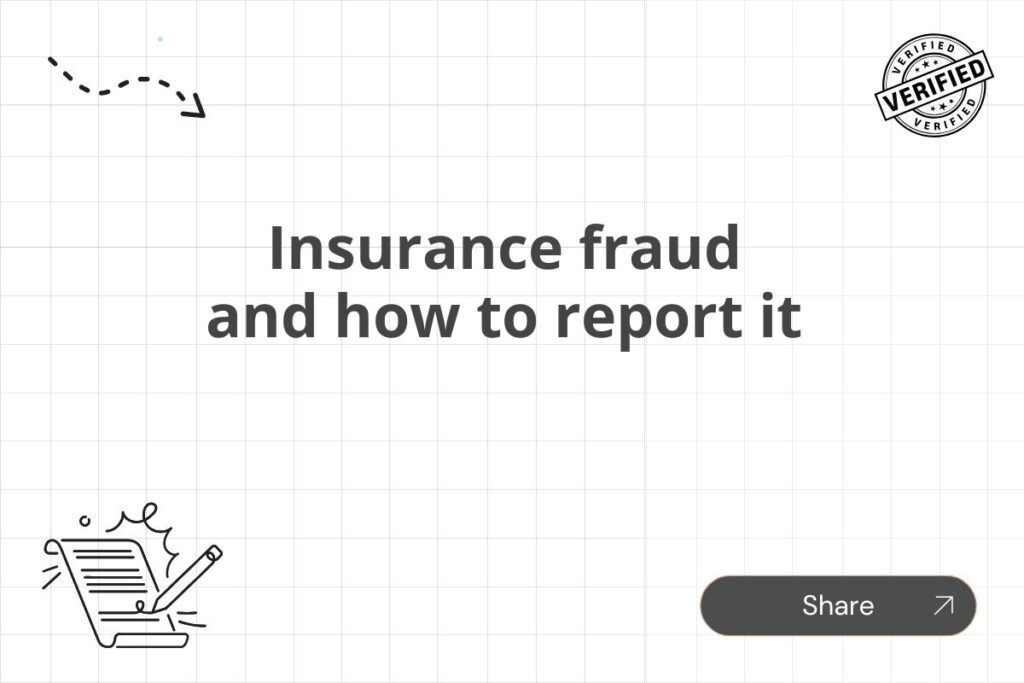Meta Description: Learn about insurance fraud, its various forms, and the crucial steps to take if you suspect or witness it. Protect yourself and others by understanding how to report fraudulent claims effectively and confidentially. Report it today!
Insurance fraud, a serious crime impacting individuals and insurance companies alike, involves deliberate deception to obtain an insurance payout or avoid legitimate financial obligations. This deceptive practice undermines the entire insurance system, leading to increased premiums for honest policyholders. Understanding the various forms of insurance fraud and knowing how to report it effectively is crucial to maintaining the integrity of the system and protecting yourself.
This article provides a comprehensive guide to insurance fraud, outlining its different types, identifying red flags, and providing a step-by-step process for reporting suspected fraudulent activities. We’ll explore the legal ramifications and the importance of proactive reporting in combating this widespread issue.
Types of Insurance Fraud
Insurance fraud manifests in numerous ways, often involving sophisticated schemes and elaborate lies. Some common types include:
- Hard Fraud: This involves intentionally staging an event or creating a false claim to receive insurance benefits. Examples include faking a car accident, arson to claim property damage, or fabricating medical injuries for health insurance payouts. This is the most serious form of insurance fraud, often involving criminal charges and hefty penalties.
- Soft Fraud: This encompasses exaggerating the extent of a loss or providing false information to inflate a claim. Examples might include claiming more damage than actually occurred in a car accident, exaggerating medical expenses, or falsely claiming stolen property that still exists. While less severe than hard fraud, soft fraud still constitutes a crime and can result in significant consequences.
- Applicant Fraud: This occurs during the application process. Applicants might provide false information about their health, driving history, or property details to secure a policy at a lower premium or obtain coverage they wouldn’t otherwise qualify for. This can lead to policy cancellation or refusal of claims.
- Staged Accidents: These involve deliberately causing an accident to file a fraudulent insurance claim. This can range from minor fender benders to more serious incidents, often involving multiple participants working together.
- Ghost Employees: Businesses might falsely claim employees to inflate payroll and receive higher workers’ compensation insurance premiums.
- Physician Fraud: Doctors or medical professionals might submit fraudulent bills to insurance companies, billing for services not rendered or inflating the costs of actual treatments.
Identifying Red Flags of Insurance Fraud
Recognizing potential signs of insurance fraud is crucial for prevention and reporting. Some warning signs to watch out for include:
- Unusually high claims: Claims significantly exceeding the value of the damaged property or services.
- Inconsistent statements: Discrepancies in the claimant’s account of events or conflicting information from witnesses.
- Lack of evidence: Insufficient documentation or evidence to support the claim’s validity.
- Suspicious timing: Claims filed shortly before or after significant life events, such as a job loss or divorce.
- Unusually quick claim filing: Claims filed immediately after an incident without any apparent investigation or delay.
- Multiple claims from the same individual: A pattern of frequent or numerous claims.
- Suspicious relationships: Connections between the claimant and individuals involved in the incident, suggesting collusion.
How to Report Insurance Fraud
Reporting suspected insurance fraud is a crucial step in combating this crime. Here’s a step-by-step guide on how to report it effectively:
Step 1: Gather Information
Before making a report, collect as much relevant information as possible, including:
- The date, time, and location of the incident.
- Details of the alleged fraud, including specific individuals involved.
- Any supporting documentation, such as photos, videos, or witness statements.
- Policy numbers and other relevant insurance information.
Step 2: Contact Your Insurance Company
Report your suspicions to your insurance company’s fraud department. They are equipped to investigate such claims and have dedicated resources for handling fraud cases.
Step 3: Contact the Appropriate Authorities
Depending on the nature of the fraud, you might need to contact additional authorities, such as:
- The National Insurance Crime Bureau (NICB): This is a non-profit organization dedicated to combating insurance crime. They have a website and hotline for reporting fraud.
- Your state’s insurance regulator: Each state has an agency responsible for regulating insurance practices and investigating fraud.
- Law enforcement agencies: If you suspect a serious crime, such as arson or staged accidents, contact your local police or sheriff’s department.
- The FBI: For large-scale or complex fraud schemes.
Step 4: Keep Records
Maintain detailed records of all communication, documentation, and actions taken during the reporting and investigation process. This documentation is essential if the matter proceeds to legal proceedings.
Legal Ramifications of Insurance Fraud
Insurance fraud carries significant legal consequences, including:
- Civil penalties: Insurance companies can pursue civil lawsuits to recover losses due to fraudulent claims.
- Criminal charges: Depending on the severity of the fraud, individuals can face felony charges leading to imprisonment and substantial fines.
- Loss of insurance coverage: Individuals convicted of insurance fraud can lose their insurance coverage and face difficulties obtaining future policies.
- Restitution: Convicted individuals may be required to repay the insurance company for any losses incurred due to their fraudulent actions.
Conclusion
Insurance fraud is a serious crime that undermines the fairness and stability of the insurance system. By understanding the different forms of fraud, recognizing red flags, and knowing how to effectively report suspected activities, we can all contribute to a more secure and trustworthy insurance environment. Remember that reporting suspected fraud is not only a civic duty but also a crucial step in protecting yourself and others from the financial and legal consequences of this widespread crime. Don’t hesitate to report any suspicion – your action can make a significant difference.






















